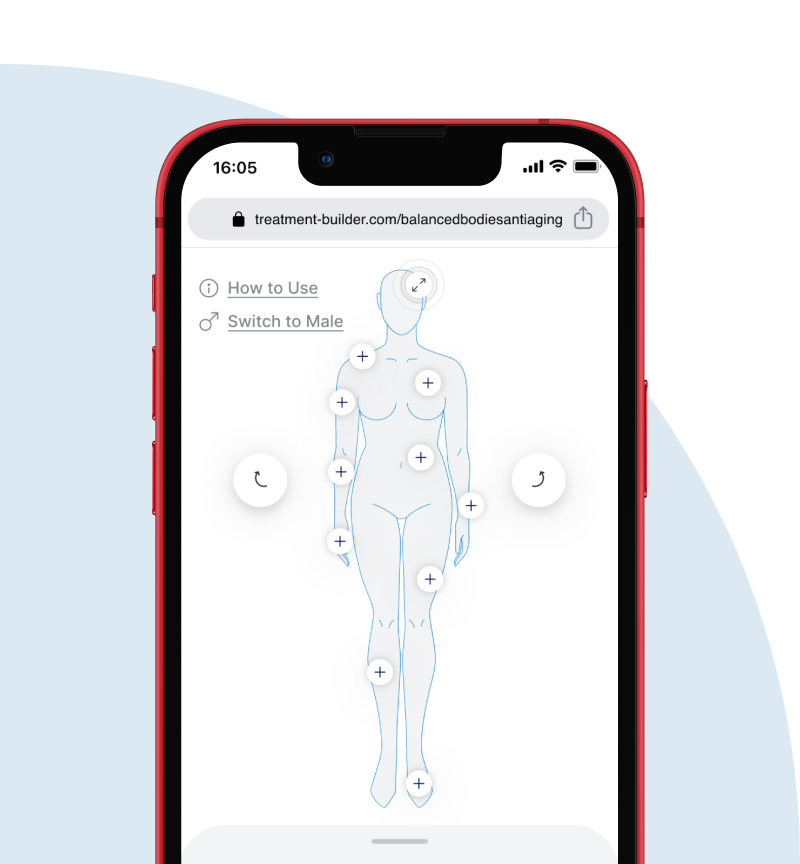
Testosterone is a vital hormone responsible for the healthy development of males and females. While both men and women can become too low in testosterone, hormone problems for women are typically related to estrogen, estrogen dominance, or progesterone. In men, low testosterone is usually the most troubling hormone issue. If you are unsure whether you need testosterone replacement, it starts with evaluating your symptoms and scheduling a telehealth consultation here at Balanced Bodies in Lawrenceville, GA and Sandy Springs, GA.
How Do You Know If You Have Low Testosterone?
You Struggle to Get or Maintain an Erection
Testosterone is crucial in achieving and maintaining an erection, though it is not the only factor involved by any means. Testosterone stimulates the production of nitric oxide, an important molecule that signals to specific cells in the penis to allow the blood flow that leads to an erection. Men who have low testosterone have a harder time getting an erection and keeping it. If you have low T, one of the first symptoms may be that you no longer get spontaneous directions during the night or early morning.
While testosterone is very important to the male erection, it’s important to note that low T is not the only thing that can affect your erections. Erectile dysfunction can also result from diabetes, too much stress, depression, anxiety, relationship issues, thyroid problems, high blood pressure, smoking, or abuse of alcohol or certain drugs. Look for some of the other symptoms of low T before assuming the testosterone is behind your difficulties.
You Have Hair Loss on the Body or Face
Balding is a natural process for many men and typically gets worse with age. Most men lose the hair on their heads due to genes inherited from their parents. However, testosterone also plays a function in hair production, so if you are noticing hair loss not just on your head, but also on your body or face, low testosterone could be the issue.
You’re Experiencing Thinning Bone Mass
This problem is most often associated with women, and certainly, loss of bone density is an issue for women in menopause. However, testosterone is also crucial to the development of bone tissue and the maintenance of bone tissue volume.
When testosterone levels drop, bone mass does, too. Those who have low levels of testosterone are at increased risk for bone fractures. If you’ve experienced fractures from events that didn’t seem serious enough to cause a break, or if your doctor has mentioned any question about bone density to you, low T is something to consider.
You’re Experiencing Anemia
Anemia causes difficulty in concentration, sleeping problems, dizziness, leg cramps, and a rapid heart rate. Research has shown that many men who suffer from anemia also have low levels of testosterone and that using testosterone replacement can improve anemia.
Your Sex Drive Is Non-Existent
It’s normal for men to experience a drop in interest in sex over time. This decline of libido can often be due to issues other than hormonal problems. Many men find that the stresses of aging, including caring for older parents, dealing with growing children, relationship struggles, and increased stress at work, can all interfere with the sex drive.
However, men who have experienced a drastic decline in their interest in sex are probably facing at least some level of testosterone drop.
You Struggle to Get and Keep Muscle
Testosterone is vital for developing and keeping muscle. When the body does not produce enough testosterone, it begins to lose muscle mass even if the person continues to eat lots of healthy protein, and work out at the gym.
If you’ve noticed that it seems unreasonably hard to maintain your muscle, even when you’re eating and exercising right, it could be due to low levels of testosterone.
You Can’t Keep Off the Body Fat
Low levels of testosterone in men create an imbalance between testosterone and estrogen. Estrogen is most commonly associated with women, but just as women need some testosterone, men need some estrogen.
For men, when there is an imbalance, estrogen causes fat to increase across the body, most often in the breast tissue and around the waist. If your diet and exercise program is otherwise unchanged, but you can’t seem to stop gaining weight, low testosterone could be to blame.
You’re Always Tired
If you have noticed that you always feel fatigued, even when you’ve had enough sleep, and have not been overexerting yourself, there’s a very good chance you’re suffering from low T. You may also lose interest in activities you previously enjoyed or find yourself without motivation when it comes to physical tasks.
You’re Not Producing Enough Semen
If you are noticing a noticeable reduction in the amount of semen you produce when you ejaculate, or if you and your partner are struggling to have children and you’ve been told by a fertility expert that low semen volume is an issue, low testosterone levels could be an issue.
You Can’t Sleep
Another common effect of low levels of testosterone is the disruption of sleeping patterns. You may find it difficult to get to sleep or to stay asleep once you are. Many men who have low T also go on to develop sleep apnea, which is when your breathing temporarily stops during sleep. This can make it harder to sleep well and lead to even greater fatigue, as well as other complications.
You Have Hot Flashes
Hot flashes are most often associated with women going through menopause, but what many people do not realize is that many men with hormonal imbalances can also suffer from hot flashes. A hot flash is characterized by a sudden wave of internal heat, usually causing your face to flush and making you sweat.
The hot flash itself happens because the blood vessels that are close to the surface of the skin suddenly expand in order to cool down. This can happen at any time but is very common at night, when they are called night sweats.
Your Memory Is Suffering
It is natural for us to struggle a bit with our memory as we get older. Mental function does gradually decline. However, if you have experienced a significant drop in mental function, particularly if you feel that you just can’t remember things, hormonal issues are very often to blame.
You Have Mood Swings
Again, mood swings are (probably unfairly) associated only with women suffering from menopause: they are also very common in men who are struggling with low levels of testosterone.
Testosterone is crucial in the regulation of your mood, and those who are suffering from low T will usually note they become easily angry, struggle to remain focused on important tasks, and are much more likely to feel depressed. If depression, anger, and lack of focus are interfering with your quality of life, talk to us in your telehealth consultation about whether testosterone replacement can help.
How Common Is Low Testosterone?
It is not completely clear how many men suffer from issues with low T, and this is in part because many men accept unwanted changes, like those described above, as simply “natural aging.” However, the data seems to show that at least two in every hundred men are suffering from low T at any given time, and your risk for having low levels of testosterone increases with age.
In general, about 20% of men in their 20s, 30% of men in their 30s, 40% of men in their 40s, and so on struggle with hormonal issues. If you are significantly overweight or have diabetes, your risk is much higher.
What Can Cause Testosterone Deficiency?
Some men have health conditions that cause their testosterone levels to be naturally low. If you have Noonan syndrome or Klinefelter syndrome, you are probably already aware that low testosterone levels are a risk. Other health conditions that you may develop can also put you at risk, such as autoimmune diseases, pituitary gland disease, infection, obesity, metabolic syndrome or diabetes, or HIV.
Testosterone levels can also drop due to the removal of the testicles because of cancer or damage to the testicles in an accident. Cancer treatments like radiation or chemotherapy can cause testosterone levels to drop, and it is a side effect of certain medications, as well, like anti-depressants and narcotic pain meds. Finally, you may be suffering from low testosterone simply due to the natural aging process, and the timing of this is different for every man.
When to Seek Testosterone Replacement Treatment
Some men who are suffering from low T do not really manifest with many symptoms and only discover the issue during a blood check. However, for most men, low testosterone levels will cause many of the symptoms described above.
If you are suffering from one or more of these symptoms, you should talk to us immediately to set up a telehealth consultation and get an idea of whether it’s wise to have more testing done to discover if testosterone replacement will help you.
Schedule Your Telehealth Consultation
If you are suffering from any of the symptoms listed above, know that you don’t have to just live with the situation. Contact us at Balanced Bodies here in Lawrenceville, GA and Sandy Springs, GA today to get started on feeling like yourself again.


